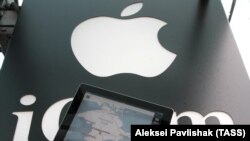“Apple has recognized Crimea as Russian,” declared the headline of a news report posted by the Interfax news agency on Nov. 27.
Russia annexed Crimea from Ukraine in April 2014. No U.N. member nation, including the United States, has recognized the annexation as legal.
In December 2016, the U.N. General Assembly passed a resolution recognizing Crimea as being “temporarily occupied” by Russia.
Most of Russia’s state media has used language similar to Interfax’s in the headlines of their reports about Apple’s decision to label Crimea as Russian territory.
The news of the U.S. tech giant’s move came from Vasily Piskarev, chair of the committee on security and anti-corruption in the State Duma (the lower house of Russia’s parliament), who said Apple had made “corrections” to the geographical names of Crimea and Sevastopol in accordance with the Russian constitution.
However, missing from Piskarev’s comments and the Russian media reports about them was the fact that the changes only applied inside Russia. Outside Russia, Apple maps and weather applications seem to continue displaying Crimea as part of Ukraine. Apple did not respond to Polygraph.info's request for comment.
Moreover, the change in how Apple’s maps display Crimea and Sevastopol is not new: it was announced back in May by the chair of the Duma’s committee on information policy, information technologies and communications, Leonid Levin. The latest “correction” only concerns Apple’s weather application.
In its Nov. 27 report, Interfax noted that “negotiations” between Russia and Apple over the issue had been going on since May and that the company had asked that deadlines be extended for “technical reasons.” According to the news agency, Piskarev said that the Duma had reminded Apple that designating Crimea as Ukrainian territory was a criminal offense under Russian law.
“We will continue to monitor, so that there is no going back,” Interfax quoted Piskarev as saying.
In July 2014, the Duma amended the country’s law against incitement to separatism to include any public declaration that Crimea is part of Ukraine. Violation of that law is punishable by up to four years in prison. It also applies to foreign companies doing business in Russia, which, if prosecuted on these grounds, risk being fined and/or banned from Russia.
The “Crimea” amendment has since been used to prosecute journalists, bloggers and political activists.
According to the profile of OOO Apple Rus, Apple’s subsidiary in Russia, in the Russian tax authority’s database, the company’s profits in Russia had been growing since it first registered in December 2011, but showed a sharp decrease in 2016-2017.
Since 2014, Roskomnadzor, the Russian government agency that oversees media and telecommunications, has insisted that Apple process and store all of its Russian users’ data on servers physically located in Russia. Apple adhered to those demands, Roscomnadzor confirmed in January.
The Russian government has demanded that other global tech companies mark Crimea as Russian territory. In 2014, following Russia’s annexation of the Black Sea peninsula, Google Maps adopted the same tactic as Apple, displaying Crimea as Russian territory for users inside Russia and as Ukrainian territory for everyone outside Russia.





